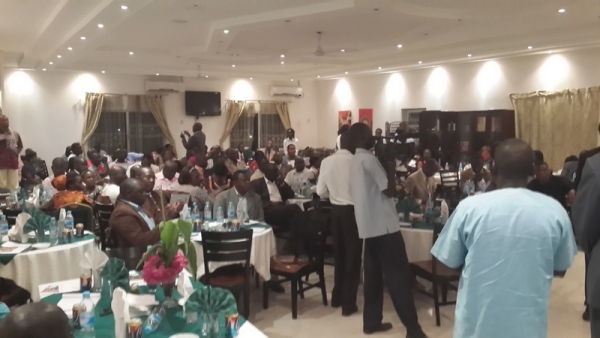Demos Shakarian and His Ecumenical Businessmen
Breakfast with the Holy Spirit: The FGBMFI
In many countries of the world one can go to a fashionable hotel and find a Saturday breakfast meeting of the Full Gospel Business Men’s Fellowship International (FGBMFI).[1] There they will see businessmen raising their hands in adoration and praise to the Lord. A speaker, most likely not an ordained minister, would give a talk or Bible teaching, and others would be invited to witness to what the Lord has done in their lives. At times the emcee- facilitator of these breakfast meetings would ask those present to raise their hands in recognition as he called out the major denominations, such as Baptist, Methodists, Presbyterians, Catholics, etc. This ritual makes it clear to all that these breakfast meetings are ecumenical fellowships.[2]

An FGBMFI meeting in South Sudan.
The FGBMFI has brought the gospel to millions of men all over the world, and then immediately baptized many of them in the Holy Spirit–something few other churches or para-churches are likely to do. This has been done mostly by the thousands (and ultimately hundreds of thousands) of members taking the trouble to invite unbelieving friends, nominal Christians, and outright skeptics to the meetings with the lure of a free breakfast. In these meetings there have always been a steady stream of healings and deliverance prayers that occur either across the breakfast table, in a healing line, or in spontaneous prayer groups that form as the official meeting adjourns. This is evangelization as in the Hebrews 2:1-4 model at its best.
“Therefore we must give the more earnest heed to the things we have heard, lest we drift away. For if the word spoken through angels proved steadfast, and every transgression and disobedience received a just reward, how shall we escape if we neglect so great a salvation, which at the first began to be spoken by the Lord, and was confirmed to us by those who heard Him, God also bearing witness both with signs and wonders, with various miracles, and gifts of the Holy Spirit, according to His own will?”
- Hebrews 2:1-4
From Armenia to California
This grand and influential para-church ministry had its roots in the Shakarian family, which fled Armenia in 1900 and settled in California. In Armenia they had belonged to a congregation of believers that had roots in an 1850’s Russian revival which manifested some of the Gifts of the Spirit, especially prophecy. They worshiped in barns and homes and were independent from the majority Armenian Orthodox Church. In 1900, a local prophet warned the fellowship of impending doom, and he urged migration to America. Many did, including the Shakarian family. In fact, after World War I broke out, Turkey began a mass deportation of Armenians to the Mesopotamian desert (1916). This resulted in genocide of perhaps one million Armenians.
Category: Church History, Summer 2014


